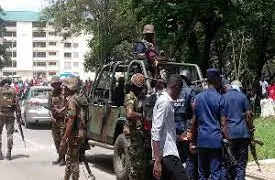The escalating conflict in Bawku, which has so far claimed eight confirmed lives, is drawing renewed criticism for what local leaders describe as a lack of effective government intervention.
Zebilla East MP, Cletus Avoka, voiced frustration on ABC Midday News, stressing that the crisis is “not just a chieftaincy matter, but a security issue.”
Avoka highlighted the sustained tenure of the Bawku Naaba, who has held his position since 1984, as evidence that the current turmoil stems not from leadership disputes alone but from government’s failure to quell the violence.
“Either negligence, inefficiency, or complicity, the government allowed this lawlessness,” he stated. “We are losing too many lives.”
Concerns over security in the Kusaug Traditional Area have intensified, as reports of targeted killings along the Walewale-Bawku route continue unabated.
Avoka pointed out that “no bus from Bawku passes without being searched,” with passengers allegedly being attacked based on their ethnic background.
According to Avoka, “There are police stations there, and no intervention, while people are freely killing people.”
The MP warned that this ongoing violence is instilling “fear, panic, and insecurity” among residents, who increasingly feel abandoned by security forces.
The conflict has also had political implications, as New Patriotic Party parliamentary candidates Dr. John Kingsley Krugu and Paul Alale Abogiri suspended their campaigns in the wake of escalating violence.
The recent unrest follows an attempt to enforce a High Court arrest warrant against Alhaji Seidu Abagre, who was enskinned as a rival chief last year, a move that was strongly condemned by the government as a threat to national security.
Efforts to arrest Abagre faced resistance at the palace of the Nayiri in Nalerigu, stirring tensions between rival factions. Political observers and security analysts fear the conflict may undermine the conduct of the upcoming elections.
As the violence continues, calls for peace and immediate resolution grow urgent amid fears of further bloodshed in the region.

































